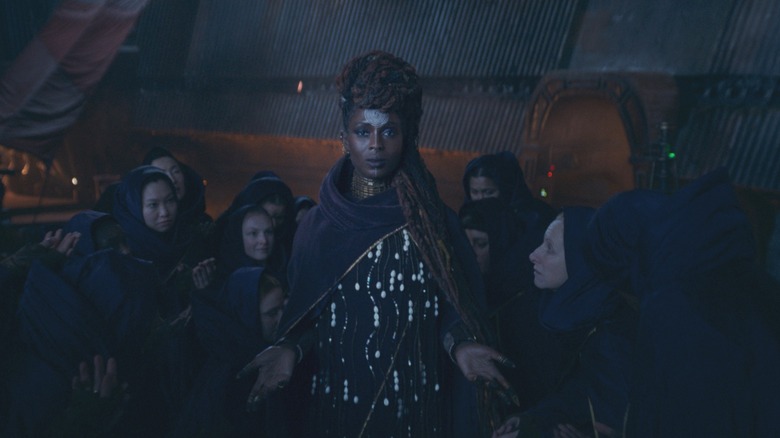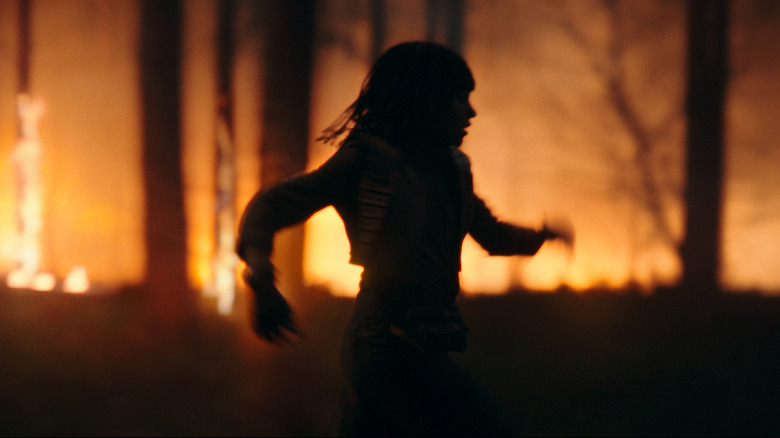Why The Acolyte Is Ripping Star Wars Fans Apart
Contains spoilers for “The Acolyte” Episode 3 — “Destiny.”
Prior to its early June debut, expectations were sky high for Leslye Headland’s Disney+ series “The Acolyte,” which is set during the tail-end of the High Republic era — around a century before “Star Wars: Episode I — The Phantom Menace.” The show follows the exploits of twin sisters Mae and Osha (Amandla Stenberg), who are on opposite sides of the Force. The first two episodes set up the duo’s conflict and Mae’s hatred for the Jedi. While reviews have been mostly positive — TheShockNews critic Matthew Jackson gave the first batch of episodes an 8/10 rating, it’s the controversial Episode 3 that has some Star Wars fans enraged.
Set 16 years before the first two episode’s events, “Destiny” shows the younger Mae and Osha (sisters Leah and Lauren Brady) living in an all-female coven of witches, led by their mother Aniseya (Jodie Turner-Smith). The witches acknowledge the Force, but suggest that the Jedi are misusing the divine power, which they refer to as “the Thread.” Mae and Osha are set to be inducted to the coven, but the Jedi stop the ceremony, claiming the Order has the right to train the children. Osha decides to go with them, leaving Mae furious. She starts a fire, killing the entire coven. The episode also reveals that Mae and Osha, like Darth Vader, don’t have a father and were born through immaculate conception.
The episode’s narrative decisions have left many Star Wars fans upset, leading to the series being review bombed on several platforms.
Why is The Acolyte being review bombed?
Even prior to its release, some Star Wars fans were dismissive over Leslye Headland’s prequel series. Certain audience members were critical of Headland’s intentions to create a diverse, female-led show, which led to toxic discussions months before its debut. Once “The Acolyte” premiered, it became a victim of review bombing on platforms like Rotten Tomatoes. As of this writing, it has a 17% audience score, a huge disparity from its positive 86% critics score. Take a brief look at some of the audience reviews and it’s clear that certain fans are being overtly critical, slamming the show with one-star ratings. “Utter drivel, I tried to enjoy the series but cancelled my [Disney+] subscription after enduring the awful 3rd episode,” shared one user, who to date has only reviewed “The Acolyte.”
This large disparity between audiences and critics isn’t just a Rotten Tomatoes issue. Metacritic has its Metascore at 67, signaling mostly positive reception. However, the User Score is a mediocre 4.3. Once again, the audience reviews are overwhelmingly negative, with many using toxic, bigoted language to describe the series with what can be considered hatred, rather than criticism.
Audience members on IMDb are also mixed-to-negative on the series, especially when it comes to the controversial Episode 3. With over 9,600 reviews, “Destiny” has an abysmal 3.6 rating. Around 59% of users who reviewed the episode gave it a 1. “This is how you ruin Star Wars … from within. The [worst] Star Wars series I have ever watched and definitely the [worst] episode I ever had to endure,” wrote one user, failing to actually criticize the show.
The Acolyte should be criticized (but not blindly)
Some audience members have issues with the show’s diversity and LGBTQ+ themes, and those should be dismissed. However, viewers should genuinely examine the legitimate criticisms “The Acolyte” has received. Cultural critics like The Critical Drinker and Nerdrotic have dubbed the show “lore-breaking” for its recent revelations, but their commentary isn’t productive. Rather, it encourages bigotry and hatred over a show that’s just getting started. As always, rage-bait and review bombings distract from actual criticism. In particular, Episode 3 has proven to be controversial, and perhaps rightfully so, as it makes major potential changes to the Star Wars canon.
The series says that Mae and Osha (Amandla Stenberg) were conceived without a father, in a similar way to Anakin Skywalker (Jake Lloyd). This could be considered sacrilegious, as Anakin was deemed the Chosen One, with his birth being an unexpected miracle. If other Force users can be conceived in a similar way, it does diminish Anakin’s importance to the larger Star Wars lore. Then again, this is Episode 3 of an eight-episode series, meaning there’s plenty of time to expand upon this.
It’s possible that Mae and Osha’s conception ties into Darth Plagueis, who had the power to create life. Also, the idea of Osha and Mae having two parents of the same gender isn’t really that big of a deal, considering Star Wars once implied that Anakin was the son of two Sith “fathers.” Seeing as the coven of witches are able to create life, it’ll be interesting to see if the series shows the Sith taking advantage of this power.
For now, audiences will just have to wait and see how Mae and Osha’s saga unravels, and if “The Acolyte” does end up actually being lore-breaking.




